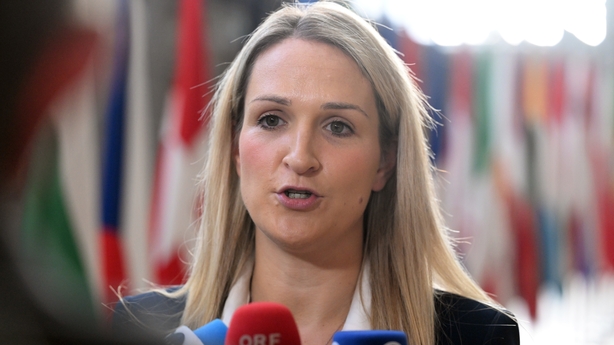Last summer, Sinn Féin leader Mary Lou McDonald described how women are "caught in a loop of déjà vu and despair" as one case of sexual violence is followed by another.
Her comments in the Dáil came a day after Minister for Justice Helen McEntee had acknowledged that there was an "epidemic" of sexual violence against women, while others in Government, including Fianna Fáil leader Micháel Martin, spoke of the need to reflect on what was "driving" this.
Throughout 2024, more women waived their anonymity to expose their perpetrators while highlighting the trauma they have gone through.
Their actions have led to more awareness around the prevalence of rape and sexual assault, but it has also put the spotlight on the Government's plans to tackle this significant problem.
While the launch of the Zero Tolerance strategy was widely welcomed over two years ago, questions are being asked about how much progress has been made in achieving zero tolerance for violence against women and what needs to happen next.

Chief Executive of the Dublin Rape Crisis Centre Rachel Morrogh has warned that the next government must maintain the momentum to address what "it itself has termed an epidemic", adding that women "should not have to try and find ways to avoid being raped or sexually assaulted".
She believes there is a window of opportunity to change the future for a generation currently in primary school.
"We are on a burning platform to get in front of this problem and to spare others from the trauma that sexual violence brings," she said.
Ms Morrogh believes it is one of the main ways that Irish society "can fight back against the tide of sexual violence" by giving important tools to children.
With some as young as eight or nine exposed to porn, she said it is crucial that young people understand the difference between real-life, respectful and healthy relations where consent is central, and the online materials they encounter that may be violent and showing stereotyped or sexist beliefs or activities.
She said these beliefs and practices are "unfortunately being repeated now in real-life expectations".
"With 40% of people in Ireland having an experience of sexual violence in their lifetime, it is important for people in public-facing roles to realise that someone they meet may be going through this."
While welcoming the planned introduction of conversations around consent in the classroom, she has concerns about the training for teachers in this area of new and important material being covered.
"Teachers regularly tell us they feel ill-equipped to deliver the content within the current limits of the training and resources provided to them," she said.
Ms Morrogh wrote to political parties ahead of the General Election and has also reached out to those negotiating a Programme for Government since then "to urge them to commit to train all teachers" in the relationships and sexuality strand of the new SPHE programme over a minimum period of four days.
She said they have observed significant demand for this training amongst teachers who "already feel at-sea".
Success will be linked to giving teachers the requisite knowledge, skills and confidence as well as activities to enable the students to be critical consumers of what they are engaging in, Ms Morrogh said.
This must be done in a trauma informed way, which "is the best-practice model", she added.
Challenging the stereotypes
Ms Morrogh said: "The trauma from sexual violence can be long-term.
"With 40% of people in Ireland having an experience of sexual violence in their lifetime, it is important for people in public-facing roles to realise that someone they meet may be going through this."
While data on sexual violence figures in 2024 have yet to be released, statistics from the previous year show around 3,400 sexual offences were reported to gardaí.
Ms Morrogh said this must be interpreted in the context of the "small numbers" who report a crime of this nature.
She wants to see more awareness across Irish society that many victims do not report a crime and may be suffering in silence.
"Reasons such as a fear of not being believed, being ashamed or feeling responsible for what happened can discourage people from reporting," she said.
Research shows that there is still a long way to go until those fears can be dispelled.
Ms Morrogh also wants to see the stereotype of the perpetrator being highlighted to better understand the more common threats.
A few months ago when she wrote about Gisèle Pelicot, the French woman whose rape trial triggered a global outcry, Ms Morrogh described how Ms Pelicot had been raped in what many people think is the safest place - her home.

She noted that Ms Pelicot’s horrifying experience is familiar to some women in Ireland.
"There are many stereotypes about rape that we’ve all been conditioned into believing is reality and this gives cover to the people who pose most risk," she said
Ms Morrogh said data shows almost eight in ten survivors of sexual violence know their perpetrator and this was "well illustrated" in cases that went to court.
The Dublin Rape Crisis Centre’s own data shows that among their new clients in 2024, 53% were raped or assaulted by someone known to them, 23% by a partner and 18% by a stranger.
Amongst people who experienced childhood abuse incidents, 92% were perpetrated by someone they knew.
"Over the course of 2024 we saw the playbook used by rapists exposed in court," said Ms Morrogh.
"At the centre of many of the cases was an unequal power dynamic, a vulnerable victim and the abuse of trust. "All of us should be able to live in this country with the realistic expectation that we are safe from rape and sexual violence," she said.
She added: "Yet time and time again, we see that there is still a long way to go before that happens."
For anyone seeking help or support, they can visit www.rte.ie/helplines







